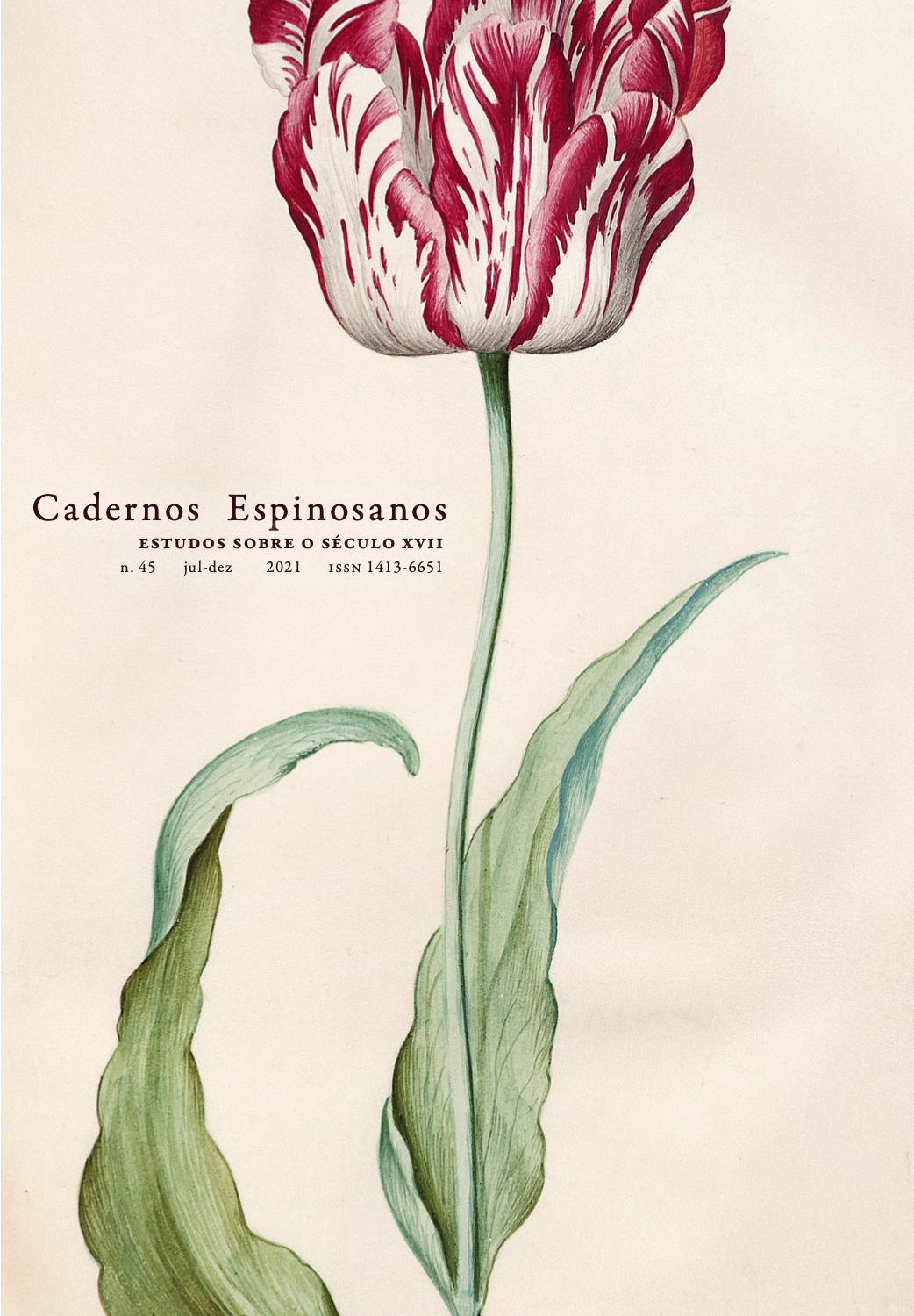John Locke the physician: the relationship between philosophy and his medical practice
DOI:
https://doi.org/10.11606/issn.2447-9012.espinosa.2021.185478Keywords:
Locke, Medicine, PhilosophyAbstract
The aim of this text is to investigate a little-known aspect of John Locke’s work: the relationship between philosophy and his medical practice. This theme is justified because his philosophical conception is widely known, but his studies in the field of medicine are practically ignored in Brazil. To accomplish this task, the article is divided into three
parts: in the first, we will address the debate on English medical practice in the seventeenth century; in the second, Locke’s penchant for medicine and, finally, in the third, Locke’s medical practice. We hope that this text can contribute to the advancement of research on John Locke in Brazil,
especially on his relationship with medicine.
Downloads
References
BACON, F (2006). Da Proficiência e o Avanço do Conhecimento Divino e Humano. Tradução de Julia Vidili. Madras Editora Ltda. São Paulo.
BACON, F (1984) Novum Organun. Livro I. Aforismos sobre a interpretação da natureza e o reino do homem. Col. Os Pensadores. Tradução de José Aloísio Reis de Andrade. Abril Cultural, São Paulo.
BOYLE, R (1966 [1772]). Some considerations of the usefulnesse of naturall philosophy. In: Birch, T. (Ed.). The works of the honourable Robert Boyle. London: Hildesheim, G. OLMS, v. II, p. 64-202. (Usefulness).
BOYLE, R (2000). The origin of forms and qualities. In: HUNTER, M. & DAVIS, E. (Ed.). The works of Robert Boyle. London: Pickering & Chatto,. v.5, p 281-491.
BROWN, J (1882). Horae Subsecivae, Vol I, 4 ed., Edinburgh.
BROWN, T. M ((1970). “The college of physicians and the acceptance of iatromechanism in England, 1665-1693”. Bulletin of the History of Medicine 44: 12-30, - Physiology and the Mechanical Philosophy in Mid-Seventeenth century.
CRANSTON, M. W. (1957). John Locke: A Biography. Oxford Papers. Oxford.
CRIGNON, C ( 2016). Locke Médicin. Classiques Garnier. Paris.
CRIGNON, C (2020). Lemps long du dialogue entre médicins et philosophes m/s n° 11, vol. 36, novembre. n° 11, vol. 36, novembre https://doi.org/10.1051/medsci/2020082médecine/sciences 2020; 36: 524.
CRIGNON, C. (2018). John Locke. Philosophe qui ne voulait pas « se mêler de médecine ». Historie de la medicine repéres. No 1, vol. 34, https://doi.org/10.1051/medsci/20183401019.
DEWHURST, K. (1963). John Locke (1632-1704), physician and philosopher. A Medical biography, with an edition of the medical notes in his journals. The Wellcome Historical Medical Library. London.
EMERTON, N. (1984). The scientific reinterpretation of form. Ithaca/London: Cornell University Press.
FRANK, R. G. (1973). Science, medicine, and the universities of early modern England. History of Science 11: 239-69.
GOMES, O. C. (1953). A Medicina do Século XVII. Revista de História. Vol. VI. São Paulo.
LOCKE, J (1978). Ensaio acerca do entendimento humano. Col. Os Pensadores. Tradução de Anoar Alex e E. Jacy Monteiro. Abril Cultural, São Paulo.
LOCKE, J. (1954). Ensaio sobre o entendimento humano. Fundação Calouste Gulbenkian, Lisboa.
ISLER, H. (1986).“Thomas Willis” Two Chapters on Headache of 1672: A First Attempt to Apply the “New Science” to this Topic”. Headache 26 (Feb.).
JAEGER, W. ( 2001). Paideia. Martins Fontes. Lisboa.
LATHAM, H. G. (1848). The Works of Sydenham M.D. Volume II. Printed for The Sydenham Society. London.
LEGA, B.C.(2006). An essay concerning human understanding: how the cerebri anatome of Thomas Willis influenced John Locke. Neurosurgery, 58(3):567-76.
MARQUES, J. (1993). Descartes e sua Concepção de Homem. Edições Loyola. São Paulo.
MONDUCCI, D. V. (2010). Thomas Willis e o De Anima Brutorum: uma concepção da mente humana e animal. Dissertação (mestrado). Universidade São Judas Tadeu, São Paulo.
NASCIMENTO, C. L. L. (2020). John Locke e a Formação Moral da Criança. Editora Café com Sociologia. Maceió.
OSLER, M. (1991). Atoms, pneuma, and tranquillity: epicurean and stoic themes in European thought. Cambridge University Press.
OSLER, W. (1913). The Evolution of Medicine. Silliman Foundation. Yale University.
PAYNE, J. F. (2019). Thomas Sydenham. Fischer Unwin, London. MDCCCC. Reimpressão Wentworth Press, London.
ROGERS, J. A. (2007) “The intellectual Setting and Aims of the Essay”. In: The Cambridge Campanion to Lock’s Essay Concerning Human Understending, Ed. L. Newman, Cambridge, Cambridge University Press.
WILLIS, T.(1978). The Anatomy of the Brain and Nerves. The Classics of Medicine Library. Editado por William Feindel, Birmingham.
YOLTON, J. W. (1996). Dicionário Locke. Tradução Álvaro Cabral. Jorge Zahar, Rio.
WOOLHOUSE, R. (2007). Locke A Biography. Cambrigde University Press, England.
ZATERCA, L. (2012)As teorias da matéria de Francis Bacon e Robert Boyle: forma, textura e atividade. Scientiae Studia. vol.10 nº 4. São Paulo.
ZIMMER, C. (2004). Soul made Flesh. The Discovery of the Brain – and How it Changed the World. Free Press, New York.
Downloads
Published
Issue
Section
License
Copyright (c) 2021 Antonio Carlos dos Santos, Henrique Batista e Silva

This work is licensed under a Creative Commons Attribution-NonCommercial-ShareAlike 4.0 International License.
Autores que publicam nesta revista concordam com os seguintes termos:
- Autores mantém os direitos autorais e concedem à revista o direito de primeira publicação, com o trabalho simultaneamente licenciado sob a Licença Creative Commons Attribution que permite o compartilhamento do trabalho com reconhecimento da autoria e publicação inicial nesta revista.
- Autores têm autorização para assumir contratos adicionais separadamente, para distribuição não-exclusiva da versão do trabalho publicada nesta revista (ex.: publicar em repositório institucional ou como capítulo de livro), com reconhecimento de autoria e publicação inicial nesta revista.
Authors who publish in this journal agree to the following terms:
b. Authors are authorized to take on additional contracts separately, to non-exclusive distribution of the article published in this journal (ex.: to publish in institutional repository or as part of a book), with an acknowledgment of its initial publication in this journal.


